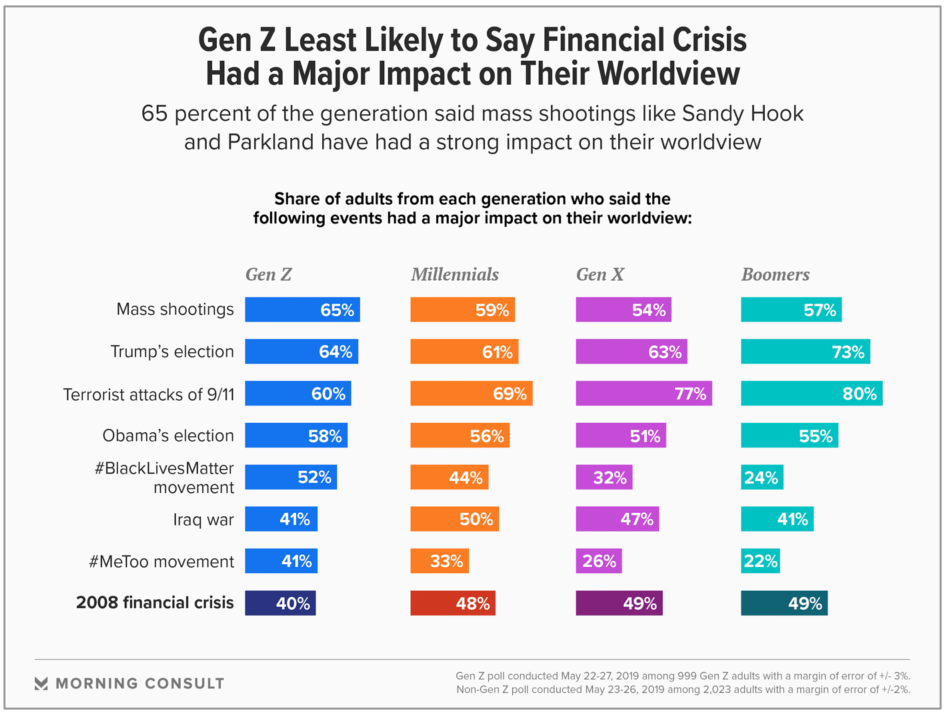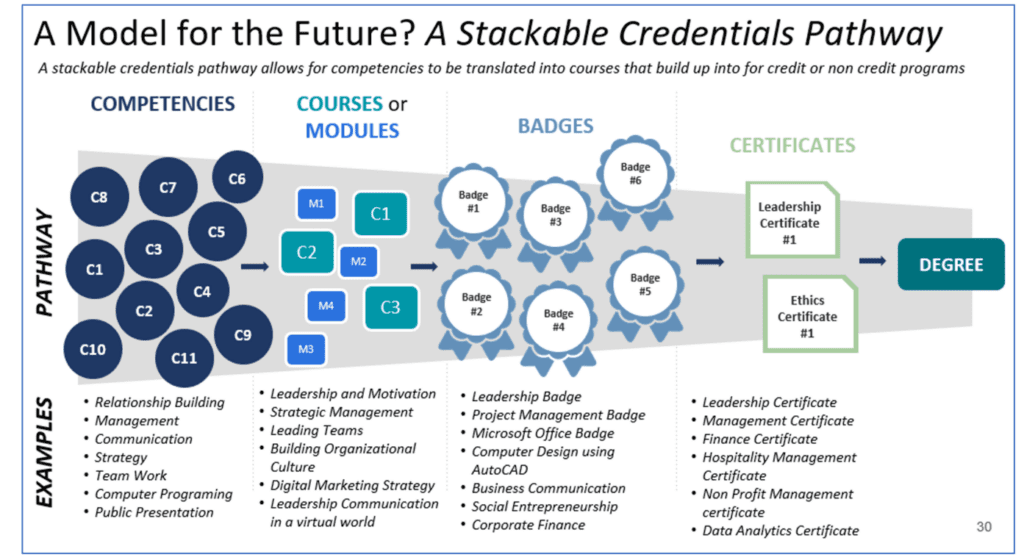Beware Higher Education: Cancel Culture and Generation Z are Here to Stay
Generation Z, those ages 8 to 23, are 67 million strong and represent one in five U.S. residents.[i] Those approximately 14 to 23, the iGeneration, are a powerful and influential group and constitute more than half of Gen Z. iGen recently disrupted President Trump’s Tulsa rally through the use of TikTok. They, along with young Millennials, are also fueling much of the cancel culture phenomena that is spreading across the world. Generation Z and Millennials are less concerned about cancel culture because the result beyond protesting a brand, product or company is the destruction or dismantling of a known entity or tradition. What makes these young people so powerful? iGen and young Millennials are more organized on social media, have different values and are also more informed than other generations. Carrying this further, they have significant potential to disrupt not only the political process, but also higher education.
As a result of being a digital native and receiving their first mobile device by age 10, Generation Z understands money better than other generations. Boomers (those 56 to 72 years of age) and Generation X’ers (those 41 to 55) were borrowers when they needed more money. Those generations were more likely to take out loans and grew up without direct access to their banking accounts. Generation Z checks their balances daily. They check prices. They compare products and read reviews. With less wealth and resources, they truly understand return-on-investment much better than other generations. A 2018 study by XYZ University of 1,800 Generation Z’ers showed that almost two-thirds prefer financial stability over spending money on something they enjoy. Colleges and universities have to better understand the value equation as they price their products and services. More progressive or innovative institutions have started to design products, programs and services with Generation Z in mind, as opposed to delivering the same legacy services to them.
 Generation Z in the U.S. is more diverse than other generations. Almost half (48%) of Generation Z are non-white, with one-in-four being Hispanic, 14% black, 6% Asian and 5% some other race or two or more races.[ii] They are also well informed and well connected, and they spend about three hours a day on a mobile device.[iii] As a result of their diversity, connectedness and also their upbringing (often raised by Gen X’ers and older Millennials), Generation Z is more environmentally, culturally and even politically connected. A 2019 survey by Morning Consult of 1,000 Gen Z’ers showed that mass shootings, the #MeToo movement and Black Lives Matter were more important to them than to other generations. In fact, it was not uncommon to find Gen Z’ers participating in BLM protests[iv] and voicing their concerns on Twitter or other social media. Greta Thunberg, the 17-year-old environmental activist, has over 4.1 million Twitter followers. Fifteen-year-old Claudia Conway, daughter of George and Kellyanne Conway, has become a major force for her generation and has over 180,000 Twitter followers in her short life on social media.
Generation Z in the U.S. is more diverse than other generations. Almost half (48%) of Generation Z are non-white, with one-in-four being Hispanic, 14% black, 6% Asian and 5% some other race or two or more races.[ii] They are also well informed and well connected, and they spend about three hours a day on a mobile device.[iii] As a result of their diversity, connectedness and also their upbringing (often raised by Gen X’ers and older Millennials), Generation Z is more environmentally, culturally and even politically connected. A 2019 survey by Morning Consult of 1,000 Gen Z’ers showed that mass shootings, the #MeToo movement and Black Lives Matter were more important to them than to other generations. In fact, it was not uncommon to find Gen Z’ers participating in BLM protests[iv] and voicing their concerns on Twitter or other social media. Greta Thunberg, the 17-year-old environmental activist, has over 4.1 million Twitter followers. Fifteen-year-old Claudia Conway, daughter of George and Kellyanne Conway, has become a major force for her generation and has over 180,000 Twitter followers in her short life on social media.
The voice of Generation Z needs to be heard in terms of redesigning higher education post-pandemic. This generation is experiencing higher education at a time when colleges and universities are creating short-term fixes in the hope of preserving enrollments for the Fall of 2020. They are hoping for a positive or at least acceptable outcome for students, knowing that the product they are delivering may not be optimal. However, if Generation Z rejects the offering and solutions made by these institutions to deliver education during a pandemic, they are likely to rebel and demand change. In addition to the yet unleashed power of Generation Z on higher education, administrators will also face the wrath of their parents. While Millennials were raised by “helicopter parents,” Generation Z is being raised by “bulldozer parents.” The relationship between a Gen Z’er and their parents is much stronger than any other generation. As a result, higher education really has two dominant audiences to serve.
With Gen Z parents being more involved and protective of their children than other generations, don’t be surprised if they opt out of sending their children to campus in the fall. As many wade through a majority of courses being online, colleges and university leaders need to consider redesigning the format for Gen Z’ers’ and employers’ long-term needs. A stackable credential model might be a stronger solution than an overpriced 120-credit win or lose bachelor’s degree. A stackable model, if done correctly, should be like a series of Legos building off each other to get to the 120-credit model. The perfect stackable model would be rewarding Gen Z students for milestones and competencies earned along the way. Even if the student doesn’t complete the entire degree, they are at least recognized for the skills they acquired to that point. If one does not complete the bachelor’s degree, the current model assumes that they have not acquired any knowledge. In fact, they are often branded as a “college dropout,” regardless of whether they completed 10 credits or a 100.
“Well before COVID we were already starting to see a shift in higher education with an increasing interest in alternative credentials, but many institutions believed this might just be a passing trend and were hesitant to disrupt their traditional offerings. But based on what we know about Gen Z and a post-pandemic recovery, this trend isn’t going anywhere.”
–Katharine H. Merritt, Director of Research & Strategy, Blackboard Inc. Marketing & Enrollment Solutions
One Possible Model for Higher Education Credentialing … A Stackable Approach[v]

A new stackable model would recognize competencies gained, courses taken, badges and certificates earned, and possibly earning the grand prize of the degree. If Generation Z comes into power post-presidential election, they may disrupt higher education. While they lack the full economic power of Boomers and the growing influence of Millennials, they do have the power of cancel culture. This should not be underestimated, as Generation Z values the presence of influencers, their peers and their networks. While they have access to larger audiences on social media, they hold very tight influential power on their parents and closed but organized networks of friends. If higher education doesn’t start to rebuild around Generation Z post-pandemic, the word will get out. Some institutions may even get cancelled and cease to exist.
[i] https://www.statista.com/statistics/797321/us-population-by-generation/
[ii] Pew Research Center, “On the Cusp of Adulthood and Facing an Uncertain Future: What We Know About Gen Z So Far,” K. Parker, R. Igielnik, May 14, 2020.
[iii] https://www.kasasa.com/articles/generations/gen-x-gen-y-gen-z#:~:text=Gen%20Z%3A%20Gen%20Z%20is,nearly%2074%20million%20in%20U.S.)
[iv] Forbes, “Gen Z Leads the Black Lives Matter Movement, On and Off Social Media,” R. Bellan, June 12, 2020.
[v] UPCEA, “Faster Forward to a New Economy and Implications for Higher Education,” Presentation. J. Fong, August 6, 2020.
Learn more about UPCEA's expert consultants.
Do you need help with your PCO unit or campus? We can help. Contact UPCEA Research and Consulting for a brief consult. Email [email protected] or call us at 202-659-3130.
Trusted by the nation's top colleges and universities, UPCEA Research and Consulting provides the best value in the industry today. UPCEA's industry experts have years of experience in Online and Professional Continuing education - put them to work for you!
UPCEA Research and Consulting offers a variety of custom research and consulting options through an outcomes-focused pricing model. Find the option(s) that best suit your institution.
Learn more about UPCEA Research & Consulting
The UPCEA Difference
Unmatched Experience: For more than 100 years, UPCEA consultants have exclusively served the needs of online and professional continuing education programs. UPCEA consultants leverage their extensive industry expertise to expedite solutions, anticipate upcoming shifts, and offer distinct best practices, effectively aiding clients in achieving their goals.
Cost Effectiveness: As a nonprofit, member-serving organization, we provide unmatched value, allowing you to maximize limited research and consulting budgets.
Action in Motion: Our cadre of experienced, skilled authorities and expert practitioners propels you forward, translating research and consulting into impactful implementation, a distinctive hallmark of UPCEA. Our team of current and former institutional leaders will support you, turning research and consulting into action.
Mission Alignment: Like you, our mission is to enhance and expand educational opportunities and outcomes for adult and other non-traditional learners. We share your values and work in partnership with you to advance access and excellence in education.
